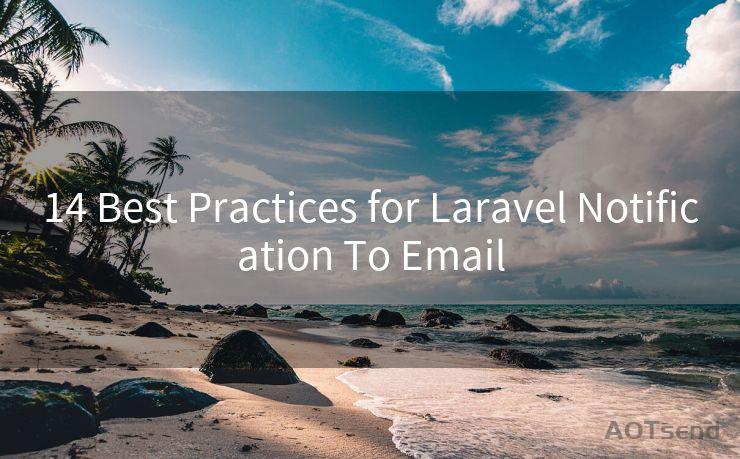14 Best Practices for Laravel Notification To Email




Laravel Notification is a powerful feature of the Laravel framework, allowing developers to send notifications, including emails and SMS, in a simple and efficient manner. To make the most of this functionality, here are 14 best practices to follow when sending Laravel notifications via email.
1. Understand the Basics
Before diving into the best practices, it's essential to understand the fundamentals of Laravel Notification. Familiarize yourself with how to create and send notifications in Laravel, and explore the various types of notifications supported by the framework.
2. Set Up Your Mail Server
Ensure that your Laravel application is correctly configured to send emails. This involves setting up a mail server or using a third-party email service.
3. Create a Dedicated Notification Class
For each type of notification, create a dedicated notification class. This helps to organize your code and makes it easier to manage different types of notifications.
4. Use Queues for Asynchronous Sending
Utilize Laravel's queue system to send notifications asynchronously. This prevents the application from being blocked while waiting for the email to be sent and improves performance.
5. Personalize Your Emails
Personalize your emails by including the recipient's name, email address, or other relevant information. This helps to create a more engaging experience for the recipient.
6. Keep It Short and Sweet
Keep your email notifications short and concise. Avoid long paragraphs and get to the point quickly.
7. Test Your Emails
Always test your emails before sending them to ensure they look and function as intended. Send test emails to yourself or colleagues to check for formatting, links, and overall readability.
8. Optimize for Mobile
Most emails are now opened on mobile devices. Ensure your emails are mobile-friendly and easy to read on smaller screens.
9. Track and Analyze
Utilize tracking and analytics tools to measure the performance of your email notifications. This helps you understand what works and what doesn't, allowing you to make improvements.
10. Follow Email Best Practices
Adhere to email best practices such as using a clear subject line, avoiding spammy words, and including a clear call to action.
11. Handle Bounces and Complaints
Set up a system to handle email bounces and complaints. This helps you identify and resolve any issues with your email notifications.
12. Use Templates
Utilize templates for your email notifications. This ensures consistency in design and messaging while saving time on creating each email from scratch.
13. Segment Your Audience
Segment your audience based on their interests, demographics, or behavior. This allows you to send more targeted and relevant email notifications.
14. Iterate and Improve

🔔🔔🔔
【AOTsend Email API】:AOTsend is a Managed Email Service for sending transactional emails. Support Email Types: reminders, authentication, confirmations, notifications, verification codes, invoices, password resets, account activations, billing statements, two-factor authentication (2FA), and one-time passwords (OTP) emails, etc. $0.28 per 1000 Emails. 99% Delivery, 98% Inbox Rate.
You might be interested in:
Why did we start the AOTsend project, Brand Story?
What is a Managed Email API, How it Works?
Best 25+ Email Marketing Platforms (Authority,Keywords&Traffic Comparison)
Best 24+ Email Marketing Service (Price, Pros&Cons Comparison)
Email APIs vs SMTP: How they Works, Any Difference?
Continuously iterate and improve your email notifications based on feedback and analytics data. Stay up to date with the latest trends and best practices in email marketing.
By following these 14 best practices for Laravel Notification to Email, you can effectively utilize Laravel's powerful notification system to engage and communicate with your audience. Remember to always test, track, and iterate to ensure your emails are as effective as possible.




Scan the QR code to access on your mobile device.
Copyright notice: This article is published by AotSend. Reproduction requires attribution.
Article Link:https://www.mailwot.com/p5109.html



